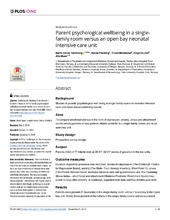| dc.contributor.author | Tandberg, Bente Silnes | en_US |
| dc.contributor.author | Flacking, Renée | en_US |
| dc.contributor.author | Markestad, Trond Jacob | en_US |
| dc.contributor.author | Grundt, Hege | en_US |
| dc.contributor.author | Moen, Atle | en_US |
| dc.date.accessioned | 2020-06-15T14:38:59Z | |
| dc.date.available | 2020-06-15T14:38:59Z | |
| dc.date.issued | 2019-11-05 | |
| dc.Published | Tandberg Bs, Flacking R, Markestad T, Grundt H, Moen A. Parent psychological wellbeing in a single-family room versus an open bay neonatal intensive care unit. PLOS ONE. 2019;14(11):e0224488 | eng |
| dc.identifier.issn | 1932-6203 | |
| dc.identifier.uri | https://hdl.handle.net/1956/22594 | |
| dc.description.abstract | Background Studies of parents’ psychological well-being in single-family rooms in neonatal intensive care units have shown conflicting results. Aims To compare emotional distress in the form of depression, anxiety, stress and attachment scores among parents of very preterm infants cared for in a single-family rooms unit vs an open bay unit. Study design Prospective survey design. Subject Parents (132) of 77 infants born at 28 0/7–32 0/7 weeks of gestation in the two units. Outcome measures Duration of parental presence was recorded. Scores for depression (The Edinburgh Postnatal Depression Scale), anxiety (The State–Trait–Anxiety Inventory, Short Form Y), stress (The Parent Stressor Scale: neonatal intensive care unit questionnaire and The Parenting Stress Index—short form) and attachment (Maternal Postnatal Attachment Scale) measured 14 days after delivery, at discharge, expected term date and four months post-term. Results Parents were present 21 hours/day in the single-family room unit vs 7 hours/day in the Open bay unit. Ninety-three percent of the fathers in the single-family rooms unit were present more than 12 hours per day during the first week. Mothers in the single-family rooms had a significantly lower depression score -1.9 (95% CI: -3.6, -0.1) points from birth to four months corrected age compared to mothers in the Open bay unit, and 14% vs 52% scored above a cut-off point considered being at high risk for depression (p<0.005). Both mothers and fathers in the single-family rooms reported significantly lower stress levels during hospitalization. There were no differences between the groups for anxiety, stress or attachment scores after discharge. Conclusion The lower depression scores by the mothers and lower parental stress scores during hospitalization for both parents supports that single-family rooms care contribute to parents’ psychological wellbeing. | en_US |
| dc.language.iso | eng | eng |
| dc.publisher | PLOS | eng |
| dc.rights | Attribution CC BY | eng |
| dc.rights.uri | http://creativecommons.org/licenses/by/4.0/ | eng |
| dc.title | Parent psychological wellbeing in a single-family room versus an open bay neonatal intensive care unit | en_US |
| dc.type | Peer reviewed | |
| dc.type | Journal article | |
| dc.date.updated | 2020-02-06T13:02:56Z | |
| dc.description.version | publishedVersion | en_US |
| dc.rights.holder | Copyright 2019 Tandberg et al. | |
| dc.identifier.doi | https://doi.org/10.1371/journal.pone.0224488 | |
| dc.identifier.cristin | 1759498 | |
| dc.source.journal | PLoS ONE | |

